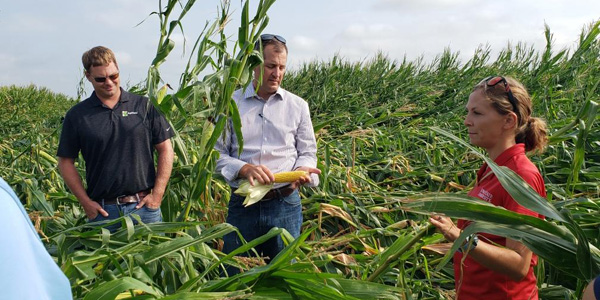
‘Derecho’ Meant ‘Teamwork’ for Extension and State Leaders
In a matter of minutes, farmers across Iowa experienced one of the most widespread and devastating storms ever recorded in the Corn Belt. Millions of acres of corn were damaged with some fields completely flattened and others barely harvestable. Grain bins were mangled. Roofs were blown off machinery sheds. Treetops and forests were shredded.
The derecho — a windstorm with high speeds topping 140 miles per hour — swept its way across Iowa and the Midwest on Aug. 10 instantly changing the growing season at a time when farmers were already dealing with drought and the COVID-19 pandemic.
During this trio of challenges, farmers and landowners turned to the Agriculture and Natural Resources experts with Iowa State University Extension and Outreach for help.
“There was a wide range of responses — obviously disappointment and frustrations were two big ones, but many farmers were also resolved to finish the season as best they could,” says Meaghan Anderson (’12 agronomy, ’14 MS crop production and physiology), field agronomist. “It was important for extension to be a calm voice as we talked through management decisions.”
Outreach started the same day. Extension agronomists talked with state agriculture leaders and members of the media, visited farmers’ fields and captured video and photographs to educate farmers across the state.
Anderson reviewed the damage from the ground and from above — joining the Iowa Department of Agriculture and Land Stewardship for an aerial assessment in August, and a second flight, with U.S. Secretary of Agriculture Sonny Perdue, in September.
“As soon as we began hearing reports of widespread damage to crops and grain bins, I knew I had to get out and see it first-hand,” says Iowa Secretary of Agriculture Mike Naig. “The ISU Extension and Outreach specialists were great resources for farmers impacted by the storm. I appreciated being able to call on their expertise during conversations with farmers and the USDA.”
When the pandemic began, the Iowa Department of Agriculture and Land Stewardship initiated weekly calls with crop and livestock stakeholder groups to get first-hand reports of the challenges happening in the field. Dan Grooms, the Dr. Stephen G. Juelsgaard Dean of Veterinary Medicine at Iowa State, Daniel J. Robison, holder of the Endowed Dean’s Chair in the ISU College of Agriculture and Life Sciences, and several Iowa State University ag economists were core participants. These briefings continued after the derecho and were essential to helping the state evaluate crop and grain bin damage.
The storm required statewide cooperation, as specialists worked closely with state and national leaders, to deliver the kind of help and assistance Iowans needed. Jay Harmon, associate dean in the College of Agriculture and Life Sciences and director for Agriculture and Natural Resources Extension, says the quick response was characteristic of the extension team.
“Extension seems to have a talent for mobilizing when there’s an emergency,” says Harmon. “Whether it be COVID-19, a flood or whatever, our staff have a real connection to clients and stakeholders. If our stakeholders feel pain, our staff feel the same.”
- One of the first major outreach projects was a webinar with extension agronomists outlining options for harvesting damaged corn, tillage and residue management.
- The Department of Agricultural and Biosystems Engineering demonstrated the effectiveness of different tillage tools to prevent
clogging and increase soil contact. - Extension specialists created videos and blog posts on the issue of volunteer corn, which is of greater concern this fall and next spring, because of the number of ears and kernels left in the field.
- Agronomists shared options for integrating cover crops into the cropping system despite damage.
- The Crops Team and the Iowa Grain Quality Initiative provided resources related to damaged grain bins, alternative storage and moisture management.
- Beef and forage specialists provided resources related to silage and forage production.
- Extension economists and farm management specialists kept farmers in the loop about the changing markets, alternative options and whole farm decision-making.
- Forestry and natural resource specialists held webinars and posted timely updates helping rural and urban landowners make good decisions about tree cleanup and removal.
Jamie Benning (’01 agronomy, ’03 MS soil science), assistant director of Agriculture and Natural Resources Extension, led regular webinars with staff and specialists that resulted in a cross-disciplinary team of crops, beef, dairy, swine, farm management, agricultural engineering, horticulture and many others working together to serve Iowans. A Storm Damages Resources page was created on the Integrated Crop Management Website with timely updates in the days and weeks following the storm.
“Agriculture and natural resource specialists have provided recommendations for high wind and derecho events in the past, so when the derecho hit on Aug. 10, they were able to quickly update resources and create new ones relative to the severity of this storm,” says Benning. “The team will meet again later this year to evaluate our response, so we are prepared to help Iowans face future weather events.”



